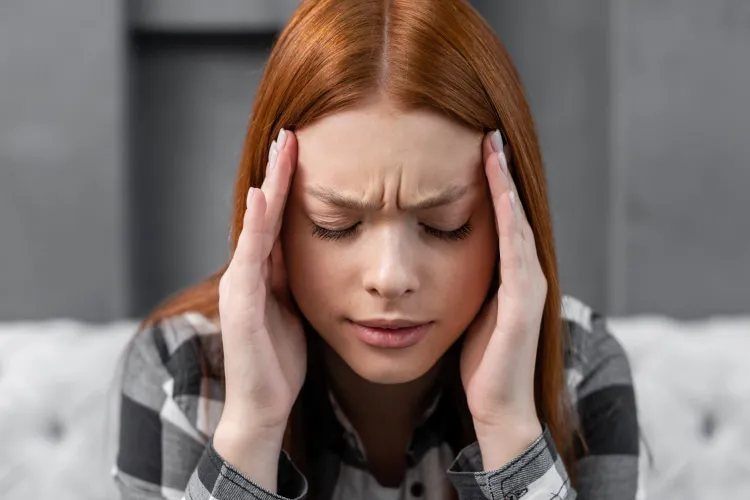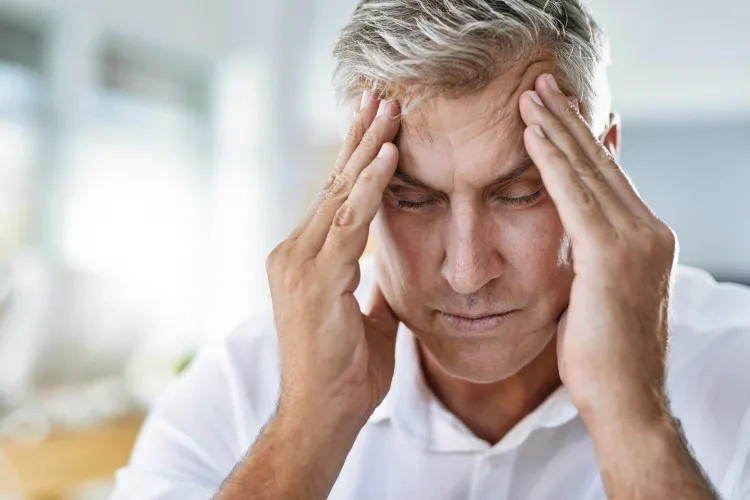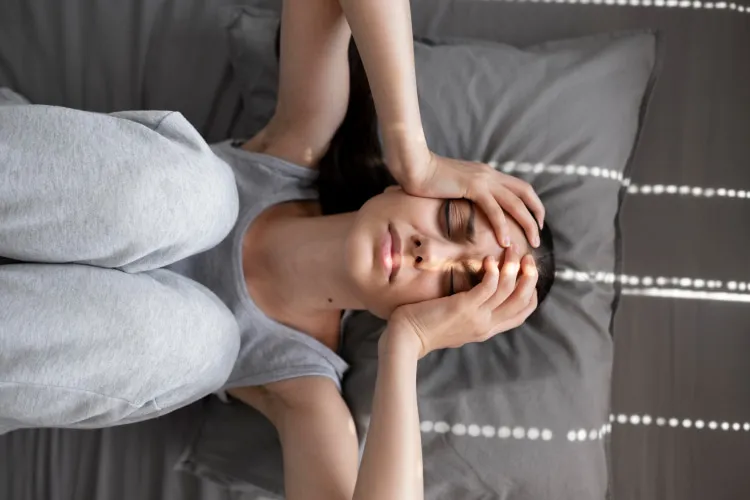Do you ever get headaches that feel like a pounding drum in your head when you’re stressed or worried? Well, you’re not alone. In this text, we’re going to explore a fascinating link between anxiety and migraines. You see, anxiety isn’t just about feeling nervous or jittery. It can also have a significant impact on our physical health, including causing those pesky migraines.
Imagine feeling a mix of fear, unease, and tension. Now, picture that these feelings might be responsible for the throbbing pain in your head. It might sound surprising, but research suggests a strong connection between them. The question is: can anxiety really cause migraines, or is it just a coincidence?
Join us as we delve into the world of anxiety and migraines. We can unravel the intricacies of their interconnectedness. We’ll explore whether stress can cause migraines and discover ways to manage these companions.
Understanding Migraines
Migraines can be a real pain, literally! They’re not just regular headaches. They’re a lot more intense and come with some extra features.
First, there’s the throbbing pain, usually on one side of your head. It can make you feel like your head is pounding. Sometimes, it’s so bad that you can’t do anything.
But that’s not all! Migraines often bring along some friends, like nausea (feeling like you might throw up) and sensitivity to light and noise. You might want to hide in a dark, quiet room until it disappears. Migraines can last for hours or even days. They can mess up your plans and make you feel exhausted.
What causes them? It’s not always clear. However, some claim that stress-induced migraine. Also, certain foods and changes in your daily routine can trigger them.
Understanding migraines is essential. It helps us find ways to deal with and maybe even prevent them. So, if you’re a migraine warrior, keep learning about your enemy!
Exploring Anxiety
Anxiety is like that jittery feeling you get before a big test or when you meet someone new. It’s when you worry a lot about what might happen in the future, and it can make your heart race and your tummy feel funny. But anxiety isn’t always a bad thing. A little bit of it can help you stay alert and focused. It’s like your body’s alarm system.
Sometimes, though, anxiety can go into overdrive. It’s like having your alarm stuck in the “on” position. It can make you feel really stressed, scared, or uneasy, even when there’s no real danger.
Anxiety can also bring physical symptoms, like a racing heart, sweating, and tense muscles. It can disrupt sleep and interfere with concentration. But stress anxiety can also cause tension and headaches.
Don’t worry, though! There are ways to manage anxiety, like deep breathing, talking to someone you trust, or even seeking help from a professional. Understanding anxiety is the first step to taking control and feeling better.

Can Anxiety Cause Migraines?
Yes, anxiety and migraines can team up to give you a tough time. Let’s break it down.
Anxiety is when you feel worried and stressed. It can make your body tense and your mind race with “what if” thoughts. Migraines are super painful headaches with extra features like nausea and sensitivity to light and noise.
Now, here’s the connection: when you’re anxious, your body can go a little haywire. It might tighten your muscles and mess with the blood vessels in your brain. That’s a recipe for migraines triggered by stress.
But it’s not just your body – anxiety can also make you more sensitive to things that trigger migraines. It can be certain foods or lack of sleep.
So, yes, anxiety can cause migraines or make them worse. It’s like a tag team you don’t want. But don’t worry; you can learn ways to manage both anxiety and migraines to find relief and feel better.
Can Stress Cause Migraines?
Certainly, stress, anxiety, and headaches are linked. It is one of the main culprits of migraines. Stress is like a heavy weight on your shoulders, and it can cause headaches.
When you’re stressed, your body can get all tense, and that tension can spread to your head, leading to a migraine. Stress can also mess with your blood vessels and chemicals in your brain. It makes them act up, which is another migraine trigger.
Stress often goes hand in hand with other migraine triggers, like not getting enough sleep or eating certain foods. It’s like a perfect storm for migraines.
If you’re living a stressful life, it’s crucial to find ways to chill out. Relaxation techniques, exercise, and talking to someone about your stress can help. Managing stress can be your secret weapon in the fight against migraines. So you can enjoy more pain-free days.
Stress, Anxiety, and Headaches: Differentiating Migraines
Let’s clear up the confusion about stress, anxiety, and headaches, especially migraines. They’re not all the same, even though they can feel similar.
Stress is when you feel pressure or tension, like having a lot to do. It can give you a headache, but it’s not always a migraine. Anxiety is about feeling worried and uneasy. It can also lead to headaches, and sometimes, those headaches can turn into migraines. Migraines, though, are a different beast. They bring intense, throbbing pain on one side of your head, along with other things like nausea and sensitivity to light and noise.
So, the key difference is that migraine has its own unique set of symptoms. Stress and anxiety, on the other hand, have more to do with how you feel in your head and body.
It’s important to tell your doctor about your symptoms. That way, the doctor can determine what you are dealing with. Will it be stress, anxiety, or a migraine? The doctor will be able to help you find the right treatment.

Managing and Preventing Stress-Induced Migraines
Preventing stress-induced migraines is a big deal because these headaches can mess up your day. They’re like uninvited guests that crash your party and bring a lot of pain.
Imagine having a big presentation at work or an important test at school. If you get a stress-induced migraine, it can make it hard to focus and perform your best. It’s like a big obstacle in your way.
Plus, migraines can last for hours or even days, making it tough to enjoy life. You might have to cancel plans or miss out on fun things with friends and family.
But the good news is that you can take steps to prevent these migraines in advance. It’s like putting up a shield against the headache invaders. Learning to manage stress and adopting healthy habits can make a big difference. So, let’s dive into the strategies to keep those migraines at bay!
Chiropractic Care
Chiropractic care can help with stress-induced migraines. Chiropractors adjust your spine to reduce tension and stress in your body. It can ease symptoms of migraines triggered by stress. Regular visits may also help prevent future migraines. It’s a natural way to manage and prevent these headaches. Always consult a healthcare professional for personalized advice.
Stress Management Techniques
Stress management techniques can help you feel better. Breathing exercises, like deep breaths, can calm you down. Taking short breaks during the day is good. Relaxation techniques like yoga and meditation can ease stress. Getting enough sleep and eating healthy also helps. It’s essential to find what works best for you to reduce stress.
Dietary Changes
Changing your diet can help manage and prevent stress-induced migraines. Avoiding triggers like caffeine and processed foods is smart. Drink plenty of water and eat balanced meals. Foods rich in magnesium, like nuts and leafy greens, can help. Keep a regular eating schedule. Remember, diet changes should be part of a broader migraine management plan. Consult a healthcare expert for guidance.
Adequate Sleep
Getting enough sleep is vital for managing and preventing stress-induced migraines. Aim for 7-9 hours of quality rest each night. Lack of sleep can trigger migraines. Stick to a consistent sleep schedule, even on weekends. Create a comfy sleep environment and wind down before bed. Good sleep helps reduce stress and anxiety and lowers the risk of headaches.
Biofeedback
Biofeedback is a technique to manage and prevent stress-induced migraines. It helps you learn to control your body’s responses to stress. Sensors monitor things like heart rate and muscle tension. You get real-time feedback and learn to relax. With practice, you can reduce stress and the chance of migraines. Consult a healthcare professional for guidance on using biofeedback.
Hydration and Caffeine Management
Water and caffeine intake can help manage stress-induced migraines. Drink enough water throughout the day to avoid dehydration, which is one of the triggers of migraine. Make sure your caffeine intake is even: too much or too little caffeine can cause stress migraine. The key is to keep a balance. Consult a medical professional for individualized advice on managing hydration and caffeine for migraine prevention and relief.
Conclusion
In conclusion, taking preventative measures is vital to living a healthy and pain-free life. If you are not ready to deal with stress on your own, We invite you to our All Injury Rehab clinic. Our clinic specializes exclusively in chiropractic care. We allow our clients to manage stress and remove any clamps without surgery. Don’t let more control your life. Take action and implement strategies with our help. It is how you can ensure your wellness. Your health is worth it, so let’s start moving toward better health today.
FAQ
Can stress alone cause migraines?
Yes, stress is a well-known trigger for migraines due to its physiological effects on the body, though other factors may also contribute.
Are migraines and regular headaches the same when caused by anxiety?
No, migraines and regular headaches are different, with migraines generally being more severe and having additional symptoms like nausea and light sensitivity.
Can a chiropractor help with migraines?
Chiropractors may help some people with migraines by addressing spinal issues, but results vary, and consultation with a healthcare professional is essential.


Related posts
Today is an era dominated by digital conveniences and desk-bound occupations. So, the effects of a sedentary lifestyle have emerged as a pervasive concern.
Our guide aims to equip people with the knowledge to understand the intricacies of internal injuries. They are arising as a result of car accidents. Join us on this informative trip.
Beyond merely treating injuries, chiropractors work to enhance the body's biomechanics. It allows sportsmen to move more potently and reduces the risk of future injuries.